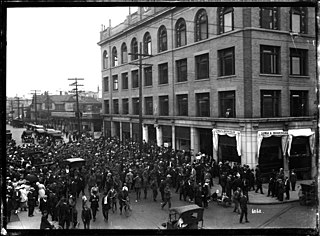Labour laws, labour code or employment laws are those that mediate the relationship between workers, employing entities, trade unions, and the government. Collective labour law relates to the tripartite relationship between employee, employer, and union.
Employment is a relationship between two parties regulating the provision of paid labour services. Usually based on a contract, one party, the employer, which might be a corporation, a not-for-profit organization, a co-operative, or any other entity, pays the other, the employee, in return for carrying out assigned work. Employees work in return for wages, which can be paid on the basis of an hourly rate, by piecework or an annual salary, depending on the type of work an employee does, the prevailing conditions of the sector and the bargaining power between the parties. Employees in some sectors may receive gratuities, bonus payments or stock options. In some types of employment, employees may receive benefits in addition to payment. Benefits may include health insurance, housing, and disability insurance. Employment is typically governed by employment laws, organisation or legal contracts.

Temporary work or temporary employment refers to an employment situation where the working arrangement is limited to a certain period of time based on the needs of the employing organization. Temporary employees are sometimes called "contractual", "seasonal", "interim", "casual staff", "outsourcing", "freelance"; or the words may be shortened to "temps". In some instances, temporary, highly skilled professionals refer to themselves as consultants. Increasingly, executive-level positions are also filled with interim executives or fractional executives.
A pre-entry closed shop is a form of union security agreement under which the employer agrees to hire union members only, and employees must remain members of the union at all times to remain employed. This is different from a post-entry closed shop, which is an agreement requiring all employees to join the union if they are not already members. In a union shop, the union must accept as a member any person hired by the employer. By comparison, an open shop does not require union membership of potential and current employees.
Featherbedding is the practice of hiring more workers than are needed to perform a given job, or to adopt work procedures which appear pointless, complex and time-consuming merely to employ additional workers. The term "make-work" is sometimes used as a synonym for featherbedding.
In labor law, a union shop, also known as a post-entry closed shop, is a form of a union security clause. Under this, the employer agrees to either only hire labor union members or to require that any new employees who are not already union members become members within a certain amount of time. Use of the union shop varies widely from nation to nation, depending on the level of protection given trade unions in general.
An employment contract or contract of employment is a kind of contract used in labour law to attribute rights and responsibilities between parties to a bargain. The contract is between an "employee" and an "employer". It has arisen out of the old master-servant law, used before the 20th century. Employment contracts relies on the concept of authority, in which the employee agrees to accept the authority of the employer and in exchange, the employer agrees to pay the employee a stated wage.

United States labor law sets the rights and duties for employees, labor unions, and employers in the US. Labor law's basic aim is to remedy the "inequality of bargaining power" between employees and employers, especially employers "organized in the corporate or other forms of ownership association". Over the 20th century, federal law created minimum social and economic rights, and encouraged state laws to go beyond the minimum to favor employees. The Fair Labor Standards Act of 1938 requires a federal minimum wage, currently $7.25 but higher in 29 states and D.C., and discourages working weeks over 40 hours through time-and-a-half overtime pay. There are no federal laws, and few state laws, requiring paid holidays or paid family leave. The Family and Medical Leave Act of 1993 creates a limited right to 12 weeks of unpaid leave in larger employers. There is no automatic right to an occupational pension beyond federally guaranteed Social Security, but the Employee Retirement Income Security Act of 1974 requires standards of prudent management and good governance if employers agree to provide pensions, health plans or other benefits. The Occupational Safety and Health Act of 1970 requires employees have a safe system of work.

Wage labour, usually referred to as paid work, paid employment, or paid labour, refers to the socioeconomic relationship between a worker and an employer in which the worker sells their labour power under a formal or informal employment contract. These transactions usually occur in a labour market where wages or salaries are market-determined.

The labor force in Japan numbered 65.9 million people in 2010, which was 59.6% of the population of 15 years old and older, and amongst them, 62.57 million people were employed, whereas 3.34 million people were unemployed which made the unemployment rate 5.1%. The structure of Japan's labor market experienced gradual change in the late 1980s and continued this trend throughout the 1990s. The structure of the labor market is affected by: 1) shrinking population, 2) replacement of postwar baby boom generation, 3) increasing numbers of women in the labor force, and 4) workers' rising education level. Also, an increase in the number of foreign nationals in the labor force is foreseen.

An employment agency is an organization which matches employers to employees. In developed countries, there are multiple private businesses which act as employment agencies and a publicly funded employment agency.
Japanese labour law is the system of labour law operating in Japan.
The degree of labour market flexibility is the speed with which labour markets adapt to fluctuations and changes in society, the economy or production. This entails enabling labour markets to reach a continuous equilibrium determined by the intersection of the demand and supply curves.

Labor relations or labor studies is a field of study that can have different meanings depending on the context in which it is used. In an international context, it is a subfield of labor history that studies the human relations with regard to work in its broadest sense and how this connects to questions of social inequality. It explicitly encompasses unregulated, historical, and non-Western forms of labor. Here, labor relations define "for or with whom one works and under what rules. These rules determine the type of work, type and amount of remuneration, working hours, degrees of physical and psychological strain, as well as the degree of freedom and autonomy associated with the work." More specifically in a North American and strictly modern context, labor relations is the study and practice of managing unionized employment situations. In academia, labor relations is frequently a sub-area within industrial relations, though scholars from many disciplines including economics, sociology, history, law, and political science also study labor unions and labor movements. In practice, labor relations is frequently a subarea within human resource management. Courses in labor relations typically cover labor history, labor law, union organizing, bargaining, contract administration, and important contemporary topics.
In Australia, labour hire is referred to by the legal term of art labour hire arrangement, and it refers to the employment practice of an employer supplying its employees to another workplace, for profit.
Agency worker law refers to a body of law which regulates the conduct of employment agencies and the labour law rights of people who get jobs through them. The typical situation involves the person going to an employment agency and then the employment agency sending the person to an actual employer for proper work.
Iranian labor law describes the rules of employment in Iran. As a still developing country, Iran is considerably behind by international standards. It has failed to ratify the two basic Conventions of the International Labour Organization on freedom of association and collective bargaining, and one on abolition of child labor. Countries such as the US and India have also failed to ratify many of these Conventions and a mere 14 other Conventions, only 2 since the Islamic Revolution.
The Labor policy in the Philippines is specified mainly by the country's Labor Code of the Philippines and through other labor laws. They cover 38 million Filipinos who belong to the labor force and to some extent, as well as overseas workers. They aim to address Filipino workers’ legal rights and their limitations with regard to the hiring process, working conditions, benefits, policymaking on labor within the company, activities, and relations with employees.
Haken is the Japanese term for temporary employees dispatched to companies by staffing agencies.
Labour hire is a form of employment in which an employer directs their de jure employees to perform work at an external workplace, belonging to a client of the legal employer.





